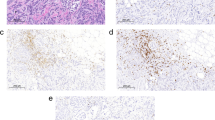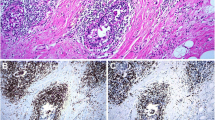In patients with primary resectable breast cancer, a positive correlation between the age and the count of CD16+ lymphocytes and a negative correlation of this parameter with the number of regulatory CD4+CD25+CD127— cells and proliferative activity of Ki-67 tumor cells were revealed. Higher level of Ki-67 was associated with reduced number of effector lymphocytes (CD8+ and CD16+) and elevated content of regulatory CD8+CD11b—CD28— T cells. The absence of expression of estrogen receptors was associated with reduced cytotoxic potential of CD8+ T cell in comparison with ER+ breast cancer. The percentage of CD8+ lymphocytes (CD3+CD8+ and CD8+CD11b+CD28+) among lymphocytes infiltrating the tumor was higher in PR+ breast cancer than in PR— tumors. With increasing the tumor load, the number of lymphocytes expressing CD16 marker and their cytotoxic potential decreased.
Similar content being viewed by others
References
Baker K, Lachapelle J, Zlobec I, Bismar TA, Terracciano L, Foulkes WD. Prognostic significance of CD8+ T lymphocytes in breast cancer depends upon both oestrogen receptor status and histological grade. Histopathology. 2011;58(7):1107-1116.
Chen DS, Mellman I. Oncology meets immunology: the cancer-immunity cycle. Immunity. 2013;39(1):1-10.
Chung YR, Kim HJ, Jang MH, Park SY. Prognostic value of tumor infiltrating lymphocyte subsets in breast cancer depends on hormone receptor status. Breast Cancer Res. Treat. 2017;161(3):409-420.
Duffy MJ, Harbeck N, Nap M, Molina R, Nicolini A, Senkus E, Cardoso F. Clinical use of biomarkers in breast cancer: Updated guidelines from the European Group on Tumor Markers (EGTM). Eur. J. Cancer. 2017;75:284-298.
Liedtke C, Rody A, Gluz O, Baumann K, Beyer D, Kohls EB, Lausen K, Hanker L, Holtrich U, Becker S, Karn T. The prognostic impact of age in different molecular subtypes of breast cancer. Breast Cancer Res. Treat. 2015;152(3):667-673.
Liu S, Foulkes WD, Leung S, Gao D, Lau S, Kos Z, Nielsen TO. Prognostic significance of FOXP3+ tumor-infiltrating lymphocytes in breast cancer depends on estrogen receptor and human epidermal growth factor receptor-2 expression status and concurrent cytotoxic T-cell infiltration. Breast Cancer Res. 2014;16(5):432.
Mohammed ZM, Going JJ, Edwards J, McMillan DC. The role of the tumour inflammatory cell infiltrate in predicting recurrence and survival in patients with primary operable breast cancer. Cancer Treat. Rev. 2012;38(8):943-955.
Sotiriou C, Neo SY, McShane LM, Korn EL, Long PM, Jazaeri A, Martiat P, Fox SB, Harris AL, Liu ET. Breast cancer classification and prognosis based on gene expression profiles from a population-based study. Proc. Natl Acad. Sci. USA. 2003;100(18):10 393-10 398.
Stovgaard ES, Nielsen D, Hogdall E, Balslev E. Triple negative breast cancer – prognostic role of immune-related factors: a systematic review. Acta Oncol. 2018;57(1):74-82.
Wang K, Xu J, Zhang T, Xue D. Tumor-infiltrating lymphocytes in breast cancer predict the response to chemotherapy and survival outcome: A meta-analysis. Oncotarget. 2016;7(28):44 288-44 298.
Author information
Authors and Affiliations
Corresponding author
Additional information
Translated from Byulleten’ Eksperimental’noi Biologii i Meditsiny, Vol. 166, No. 8, pp. 200-203, August, 2018
Rights and permissions
About this article
Cite this article
Zabotina, T.N., Korotkova, O.V., Chertkova, A.I. et al. Tumor-Infiltrating Lymphocytes in Breast Cancer. Association with Clinical and Pathological Parameters. Bull Exp Biol Med 166, 241–244 (2018). https://doi.org/10.1007/s10517-018-4323-3
Received:
Published:
Issue Date:
DOI: https://doi.org/10.1007/s10517-018-4323-3




